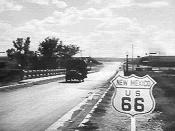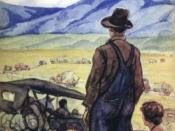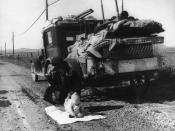The Grapes of Wrath Essay - Journey Author John Steinbeck's messages and ideas are effectively delivered to the readers through themes and key events in several levels that dominate the novel. The journey is a suitable key to unlock and dramatize Steinbeck's ideas in his novel, The Grapes of Wrath. In general overview of the novel, there are three levels of the journey. To begin with, the first level (a literal level) is unmistakably the Journey of the Joad family that sets up the story. Second level, or the general level, is Migrations of Workers journeying ambitiously towards and inside the state of California. And lastly, the Journey of Humanity would be the symbolic level that's probably being delivered not directly but more effectively to the readers. In every level of the journey, Steinbeck describes his point of view of the sullen society in turmoil during the Dust Bowl Era.
Steinbeck sets the Joad family's migration to the West as the first level of journey to simply represent and describe the migrant families' somewhat unfortunate lives in California. Breaking down the whole story of the Joad Family, struggles and hardships they had to interfere cannot be missed to portray their journey. The affliction begins with Tom discovering that his family has moved away from the house because after the Dust Bowl Era, along with others the Joads had to abandon their demolished land and trail the footsteps to California. Struggle continues in the West as some of the Joads are being discriminated by Californian landowners who viciously call the migrants as "Okies" and as time passes by, some family members are leaving their family due to starvation, lack of individual strength, and their selfishness to benefit only themselves; "If I'd knowed it would be like this I wouldn' of came. I'd a studied nights 'bout tractors back home an' got me a three-dollar job" (343) and this quote by Rose of Sharon's husband Connie foreshadows his departure later in the novel. The characters sketched in The Grapes of Wrath develop during their journey. Jim Casy, who has once worked as a preacher, becomes a man's leader and the philosopher that influences the migrants around California, showing a Jesus Christ figure. And other main characters like Ma and Pa change their roles in the family circle as Ma takes charge of the whole family, and the character that matures and goes on a biggest change would be Rose of Sharon who, in the end of the novel, gains a capacity to tell between what's right and wrong in the society as she breast-feeds the starving man on the street. The "I to We" theme is applied to the journey of the Joads as the family bond starts to break and reunite again. After the Joads arrive at the Weedpatch Camp, they are awestruck by the organization of the migrants and the modernized commodities in there, but they soon begin to realize that the other migrants in there are also suffering and are anxious about their future since the persistence is required to work under the landowners since they are being paid a lot less than they anticipated and the mistreatment of the migrants are beyond cruel. Another example of "I to We" would be some of the Joads that tend to stay together as a family even after many members' departures and also as the minorities struggling to surpass the hardships. Thus, without their journey to California, none of these things would have occurred, and without the journey, there is no story to show Steinbeck's message.
The structure of the novel is unique; there are interchapters between every corresponding story chapters that directly depict the migrations of workers, which is the general level of the journey. The interchapters describe migrants' feelings towards the landowners and their actions in the West. Feeling desperate to survive from the Californian society that is full of insatiable landowners produces some enraged organizations that condemn the mistreatment of the migrants. The women are relieved when men are not broken by the Dust Bowl and although they are going on the hard journey, they believe they can tide of over the crisis as men are still going strong, yet getting stronger as their anxiety and fear turns to anger. The journey of the migrants also creates the vision of how the society was working during the Dust Bowl Era. If the journey of the Joad family provided a deeper vision of one particular family and their own struggles, the journey of the whole migrants itself provides a simple and concise vision of the migrating life. The general information such as overflowing workers in a small farm supports the reason why the Joad family had hard time earning money in the grape farm. Between the hard feelings and horrible situations continuously occurring during the journey, there is a glimpse of hope that would help the migrants pull through. Like the Joads, a lot of migrants notice the importance of unity and manages to take each other's hands to survive the situation together after the flood. And the readers shouldn't forget the turtle that represented the migrants and the quote related to its strength from the third chapter; "Lying on its back, the turtle was tight in its shell for a long time. But at last its legs waved in the air, reaching for a long time" (23).
The journey of humanity, also known as the symbolic level of journey, is one of the most significant articles of the novel. This journey of humanity could be the result of two other levels of journey being summed up together. The negative side of human nature is shown through the conflict between the landowners and the migrants. Since the landowners want more profits, they obviously don't see the point of mutual benefits thus they are entitled to their opinions and put the migrants in dismay as they pay them very low. Because the landowners are skeptic about the migrants uniting together to take revenge on them, they try their best to break them up, not realizing that it makes more migrants to join their own organizations during their journey. A humanity journey the migrants go on reveals the fact that every mankind tends to commit sins as they face desperate situations, but some change for the better. Since the migrants don't have satisfying incomes to feed the family, some of them disappoint and betray others as they choose to assist the "monster" banks and landowners by becoming a tractor driver or being hired to raise riot in the Saturday Dance at the Weedpatch Camp where the migrants are organizing themselves. In contrast, Tom is the good example of the man changing for the better, because although he has killed two people in desperate situations, he makes a crucial decision to leave his family and continue Casy's work of unity for the better life of the migrants. This level of journey seems important, also because it represents what's most likely to be the main theme of the novel, Unity. Unity could also be the universal theme that can be applied to today's world since it occurs anytime, anywhere in every human nature. In this novel the migrants realize the importance of unity during their journey and their life is prospected to be better when they unite together.
In conclusion, the different levels of journey earnestly dramatize Steinbeck's messages of unity, human nature, and hardships in life migrants had to suffer from. With the Joad family, the readers would be able to feel and see through the man's inhumanity to man most effectively during the climax of the novel when Casy gets killed by the guards in Hooper Ranch. To directly send out the information about migrants' life in California, Steinbeck uses interchapters, and he also delivers the message of hope that wriggles out from despair as he describes his characters in the novel going through the significant changes. Perhaps it's Steinbeck's flawless ability to set the journey structure effectively that makes the book seem so realistic and perhaps that's why the message of humanity journey is still sent and widely influences the world today.





